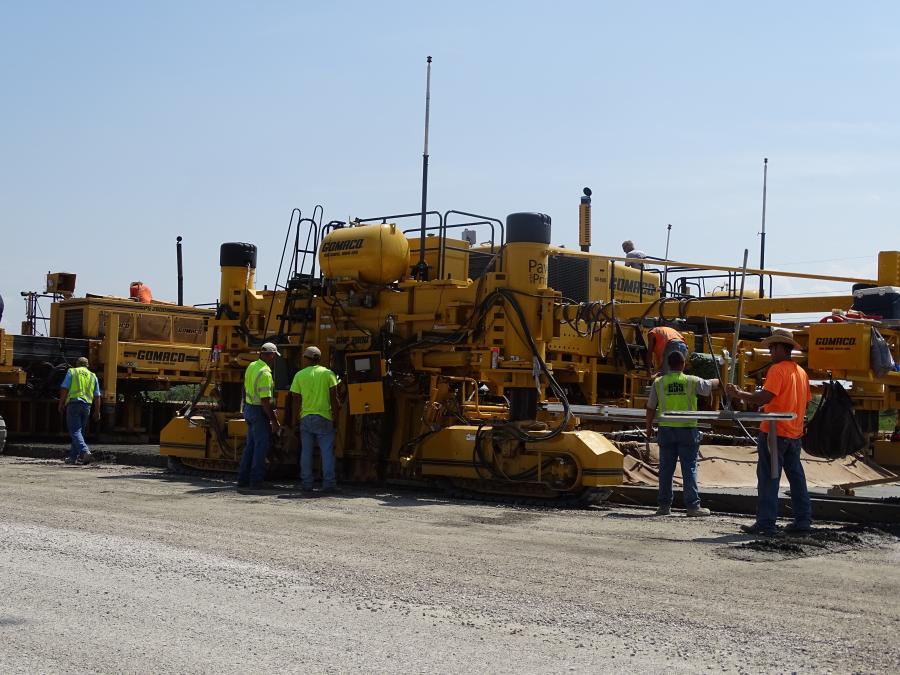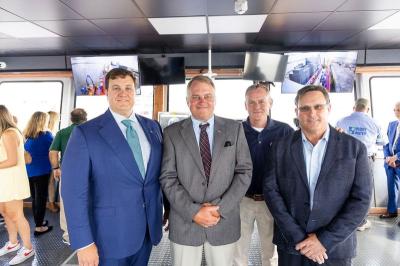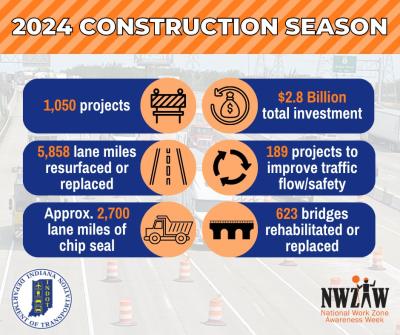“We operate as a team and work really well with each other and for our people in the field,” Jones said. “We come up with some creative ideas and we lean on our field staff to pull off whatever we think they can do. It’s important that everyone understands their challenges and be open to new ideas.”
(Emery Sapp & Sons Photo)
Billy Sapp, 24 at the time, started Emery Sapp & Sons, Inc. (ESS) in Columbia, Mo., in 1972 with his brother Elvin, 34, and his father Emery. The construction company for which department of transportation work accounts for about 50 percent of annual revenues, started with one piece of equipment and one employee with a focus on water and sewer installation to one that has over 650 employee-owners.
Today it operates in five states — Missouri, Kansas, Oklahoma, Arkansas and Texas, and regularly secures contracts to do site work for hospitals and other developments; major earth work, excavation and grading operations; underground utilities; and asphalt and concrete paving, bridges and related infrastructure for departments of transportation.
The company's client-base entails the public and private sectors, including all levels of government, military and aviation, utilities and residential and commercial construction.
While employee-owned since 1999, Billy Sapp, president and CEO, still guides the company which continues to grow based on the philosophy of "being in business tomorrow means satisfying our customers today."
Sapp, put forward this principle from the start, and since then the company has won the respect of its clients and has secured national and regional awards for its work and ethics.
From the start, ESS has been based in Columbia and now has offices in other parts of the state — Kansas City (opened in 2004), Springfield (opened in 2008) and Joplin (opened in 2013).
Prior to ESS and afterwards, Emery and Elvin were building homes and subdivisions, and Billy worked for them.
"I had done a soil and earth work and in 1972 we started ESS," said Billy. "I learned much from being around them, particularly how to treat people. I just loved construction and as ESS grew in the early years, I received an excellent education on how to build a business and get it right. Elvin was there to help support me, but from the beginning it was really what I wanted to do. In 1973 I bought my father out and the company purchased a Smith slip-form paver, which allowed us to do concrete streets and other road infrastructure. We started growing from there. Developers knew that we could move dirt, install pipes and pave roads in one lump sum and give them a quality service.
"After going into paving, one of the keys was preparing the subgrade," he said. "It was one of the hardest parts to master, but when I bought a CMI trimmer to help prepare the subgrade, we went from paving two or three times a week to paving every day. That was a critical step in the whole operation and I was fortunate to put good people around me — a lot of those people have been with me as long as 35 years. I always embraced technology and was the first contractor in Columbia that had a hydraulic excavator and use of a laser beam to lay pipe. Today we pave stringless and have people around us that put new knowledge, equipment and tools to work."
Elvin sold his share of the business to Billy in 1984, and the company continued to expand. The 1993 purchase of 4-M Bridge, which built bridges, was a game changer.
"That let us do more Missouri Department of Transportation work," said Sapp. "We did projects for the DOT prior to that — earth work, pipe installation and pavement, but having the bridge company gave us the opportunity to do interchanges, road construction and bridges. We self-perform 85 percent of all our jobs and that was the key. We never get into liquidated damages — we always finish the job in a timely fashion and give the customer what they expect."
While impacted by high interest rates in the early 1980s, ESS weathered the storm and continued to grow.
"Columbia has never stopped growing despite some slowdowns," said Sapp, "and it's been vital for us to have a good presence in Columbia. It allowed us to expand to where we are now. We'll keep expanding as the work allows us. We're heading to open offices and equipment shops and yards in other states."
MoDOT's I-55 in the Boothill of Missouri project in 1989 is one the projects that put ESS on the map.
"It was a concrete overlay job — one of the first in the state," said Sapp. "We also did major subdivisions in the area. We did major repair work in 1993-95 — in a timely fashion, when we had all the flooding in the Midwest. All that work just compounded. We did a big job — $130 million — in 2014 for a bypass in Lawrence, Kansas, where we had over three million cubic yards of dirt to remove, 21 bridges to build and lots of pavement to place."
By 1980 ESS had 50 people on staff. This increased to 100 by 1990, 200 in 2000 and over 650 today, with 530 in the field as construction workers, 22 in planning and engineering, 24 in estimating and 20 in overall management.
One the key people at ESS is Chip Jones, P.E., its DOT branch manager, who joined the company in 1999 and since then, oversees 200-plus employees and has successfully completed more than $900 million in highway and bridge projects.
"We operate as a team and work really well with each other and for our people in the field," he said. "We come up with some creative ideas and we lean on our field staff to pull off whatever we think they can do. It's important that everyone understands their challenges and be open to new ideas."
ESS's estimators are able to prepare successful bids because they know what can be achieved.
"They're above and beyond most and at the top of their game," said Jones, a Civil Engineering graduate from University of Missouri-Columbia who was a MoDOT inspector for 10 years. "They can take a set of plans apart and understand how to build it better than the DOT does. They'll figure out if there are issues and submit questions to the DOT. The main thing is to deliver on your promises. If you make a commitment, you have to honor it. We would rather under promise and over deliver."
Jones also stressed the importance of experienced employees mentoring new ones to pass on their knowledge and for new people to share their knowledge and enthusiasm.
"It's all about keeping our eyes and ears open and being receptive to new ideas," he said, "with the attitude of ‘let's give this a shot.' If you don't try something different, you're going to be left behind. Today 80 to 85 percent of our paving is stringless."
Jones was recently elected to be the 2019 board chairman of the Associated General Contractors of Missouri, a significant honor that reflects his experiences at ESS.
"The company is respected in Missouri," he said. "We value participating in organizations. Rusty Crane, our chief estimator, got me active in the AGC. If we have problems with the DOT, one large voice is better than a bunch of individual voices."
Like Sapp, Jones sees continued growth for ESS based on its customer-driven attitude.
"If there's going to be a problem," he said, "we usually know it beforehand and bring a solution to the owner so they have time to react. That helps us stay on schedule. Billy is a remarkable individual and his visions are a lot to do with how successful we are. We are committed to quality and meeting schedules."
The decision to go from being family-owned to a 100-percent employee-owned business was based on the company's rapid growth.
"I built this operation up to a large size and I wanted to cash out at some point," said Sapp. "I'm still active today, but I wanted to protect the people that helped me get there. The transition was a success for everyone. We get more top quality help because they have an ownership portion."
"We treat everyone as an owner," said Jones. "The best way to get the most out of an employee is to give them a career path and opportunities to advance."
Billy's son, Shawn, works for ESS and like his dad, has experienced working in the field all the way to management.
"That experience gives me a lot of respect with the employees," said Billy. "I am the American dream. I started out with very little and have done well."
ESS also makes it a point to give back to the community — locally and regionally — via its offices to help out initiatives with financial support and volunteers.
"What we expect from ourselves in terms of effort and commitment to a job site is the same energy we put into giving back to the communities in which we live, work and grow," said Sapp. "We support schools and a lot of charity events because it takes all of us to make it work. We also go to a lot of schools to promote the construction trades and have been very successful at it."
With more than 500 vehicles and pieces of equipment, ESS has the ability to self-perform as much as 85 percent of the work on individual projects, which means that Scott Zepp, the company's equipment manager, is invaluable to the day-to-day operations to ensure benchmarks are met. This is a team effort that unites nine assistant managers, 44 mechanics, and those responsible for the purchasing of spare parts, new equipment, and various oils and fluids.
"It is very important to stay on top of maintenance and repair," Zepp said. "Don't defer maintenance. These machines don't tend to fix themselves. When time and resources allow, fix it right. We don't like to fix a machine just to finish this job – we want that machine to be able to go do the next 10 jobs. Know your limits and the limits of your staff. Don't be afraid to get dealers involved — whether you do so because of time constraints, current backlog or technical knowledge. We seek out available training opportunities and classes through dealerships and manufacturers. The majority of our mechanics use laptops and web-based diagnostic tools on a daily basis for trouble shooting and repairs.
"Communications between operations and maintenance staff is very important," Zepp said. "Also keeping in constant communication between staff within the maintenance department itself. Communication helps you stay on top of the maintenance and repairs needed. It allows you to know when a problem is beginning to show up before it becomes major."
Renewing the fleet with machinery that has the latest IT, GPS, and monitoring systems to aid with repairs is extremely important.
"All of our machines have telematics," said Zepp. "We track location and utilization, and manage our preventative and scheduled maintenance with the aid of telematics units. GPS motor controls are equally important. Operators and job foreman rely heavily on the precision that modern motor controls afford. IT systems allow us to know exactly where, when and for how long a machine has been run. This allows mechanics to schedule service work and travel directly to machines that are not running. There is no run around to find machines."
Almost all of ESS's scheduled maintenance is done in the field, and close to 70 percent of breakdowns are repaired in the field.
Zepp joined ESS in 2005 as an assistant manager. The fleet he oversees is based in seven shops in three states, including the 30,000-sq.-ft. one in Columbia with 14 service bays. The smallest shop, in Springdale, Ark., is around 8,000-sq. ft. and can service several vehicles.
The large fleet has cranes, dozers, excavators, backhoes, loaders, pavers, rollers, scrapers, articulated trucks, concrete plants, asphalt plants, aggregate production pieces and a large fleet of on-road trucks. It also is diverse with Cat, Komatsu, John Deere, Case, Volvo, MTS, K-Tec, Wirtgen and GOMACO, pieces, along with Link-Belt cranes.
ESS purchases equipment from dealerships such as Fabick Cat in Columbia and Springfield, Foley Cat in Kansas City (Mo.), Roland Machinery in Columbia, Berry Tractor in Springfield, Martin Equipment in Columbia and Murphy Equipment in Kansas City and Springfield.
"We rely on our dealers for support both in the field and in the background," said Zepp. "They have access to manufacturer support and training that the customer never will. They receive cutting edge training on new machine systems from manufacturers that the end customer usually has to learn on their own. They are pretty good at helping us with the learning curve, and take the time to assist with learning new technology through one-on-one field training and classroom sessions. They also provide operator training. When it comes to new machine selection, dealers are the first to know what manufacturers are bringing to market and are able to help us with new ways to approach differing projects."
ESS returns the respect.
"Dealers like to deal with a customer that has realistic expectations of service provided," said Zepp. "We have no true agreements with dealerships other than the strong relationships that we have built over the years. I meet regularly with dealer representatives. This allows us to maintain open communication to stay on top of repair work being done and keep them in the loop of any machine needs we may have coming up."
The company owns a sizable portion of its fleet, but also leases and rents equipment.
"It all depends on the machine," said Zepp. "We have a lot of history that allows us to know the useful life of each machine. We replace about five to 10 percent of our fleet annually. Purchase vs. lease decisions are made on a per-machine basis depending on our future outlook for that machine."
Safety is important to ESS and it has a full time staff dedicated to the training of employees, both in the field and in offices. While the unexpected can occur, the company's efforts enable it to secure superior safety performance annually.
"Safety is number one at ESS: it's the first thing talked about and the first thing that is looked at in every aspect of our work," said Zepp, and that includes equipment and operators. "Every employee is a safety officer and has the ability to stop work or shut down a machine for a safety hazard or an unsafe condition. We will not ask or allow anyone to operate an unsafe machine. Our management software has a safety module that allows foreman and superintendents to send safety alerts directly to the equipment department for immediate action." CEG
Today's top stories

















